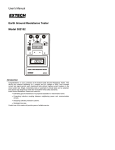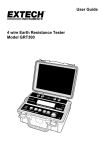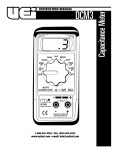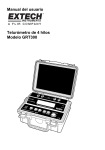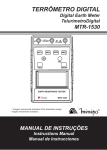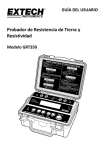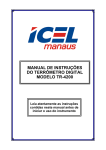Download User's Manual Earth Ground Resistance Tester Model 382152
Transcript
User's Manual Earth Ground Resistance Tester Model 382152 Introduction Congratulations on your purchase of the Extech Earth Ground Resistance Tester. This device can measure resistance (in 3 ranges) and AC voltage to 200V. 2mA constant current test signal permits earth resistance tests without tripping current breakers in the circuit under test. Single, momentary tests or automatic 3-minute tests can be selected. This device was designed to meet IEC-1010 (EN 61010) safety standards. Earth Ground Resistance Testers are useful for: Estimating ground resistance of a proposed substation or transmission tower. Computing inductive coupling between neighboring power and communication circuits. Designing cathode protection systems. Geological surveys. Careful use of this meter will provide years of reliable service. Safety Please read the following safety information carefully before attempting to operate the meter and use the meter only as specified in this manual. Environmental safety information Do not use meter outdoors when precipitation is likely Installation Category III Pollution degree 2 Altitude: 2000 meters max. Ambient conditions: 32 to 104 F (0 to 40 C); RH: 80% max Observe the following international safety warning symbols o o Safety Symbols Caution: Refer to this manual before using this meter Dangerous Voltages Meter is protected throughout by double or reinforced insulation Organizations that provide rules and guidelines for proper grounding The National Electrical Code (NEC) Underwriters Laboratories (UL) National Fire Protection Association (NFPA) American National Standards Institute (ANSI) Occupational Safety Health Administration (OSHA) Telecommunications Industry Standard (TIA) 2 382152-EU-EN v2.2 07/13 Meter Description 1. Earth ground test lead terminal 2. Test status LED 3. Data Hold switch 4. Automatic 3-min. test OFF button 5. LCD Display 6. C1, P1 Aux bar test lead terminals 7. Function select switch 8. Resistance range select switch 9. Push-button momentary test 10. Automatic 3-min. test ON button 3 382152-EU-EN v2.2 07/13 Operation Test Connection Diagram Red lead Yellow lead Green lead METER C1 P1 Bars equidistant 17 to 33 ft (5 to 10m) apart E 17 - 33 ft (5 - 10m) Ground surface Existing ground connection Test Preparation and Setup 1. Connect the test leads to the meter as follows: Green lead to the 'E' terminal Yellow lead to the 'P' terminal Red lead to the 'C' terminal 2. Drive the Auxiliary Earth Bars C1 & P1 (included) into the ground. Align the bars equidistant to the existing Earth ground connection and in a straight line as shown in the diagram above. 3. Ensure that the bars are between 17 and 33 ft (5 and 10 meters) apart. If the auxiliary bars are placed in close proximity to the ground stake, measurement inaccuracies will result. 4. Connect the clamp ends of the test leads to the Earth bars and existing ground connection spike as shown above. Earth Voltage Test 1. Set the meter's function switch to the ACV position. 2. Press the PUSH-ON button to perform a single, momentary test. 3. Press the PUSH-ON and TIMER ON buttons simultaneously to begin a 3-minute test. The 3minute test automatically shuts down after 3 minutes. Press the Timer OFF button to end an automatic test at any time. 4. The front panel test status LED will light if the test is operating correctly. If the LED does not light check for problems such as open circuits or overload conditions. 5. Note the LCD reading. 6. Confirm that the voltage measurement is less than 10V AC; otherwise accurate Earth resistance measurements cannot be made. If voltage is present (higher than 10V AC), the source of the voltage must be found and corrected before testing can continue. 4 382152-EU-EN v2.2 07/13 Earth Resistance Test 1. Set the meter's function switch to the ohms position and set the range switch to the desired resistance range. 2. Press the PUSH-ON button to perform a single, momentary test 3. Press the PUSH-ON and TIMER ON buttons simultaneously to begin a 3-minute test. 3-minute tests automatically shut down after 3 minutes. Press the Timer OFF button to end an automatic test at any time. 4. Note the displayed reading. The front panel test status LED will light if the test is operating correctly. If the LED does not light, check for problems such as open circuits or overload conditions. 5. If high resistance is detected, note the value and take appropriate steps to correct the ground connection if necessary. 6. Readings “1” are typical when the test leads are not connected to the meter. Data Hold Data Hold freezes the latest measurement reading on the LCD. 1. Select ON from the Data Hold selector switch to turn Data Hold ON. 2. The reading that was on the display when the switch was set is now held on the LCD. 3. The Data Hold function does not retain measurement data if the meter is turned off. 4. Select OFF from the Data Hold selector switch to return meter to normal operation. 5 382152-EU-EN v2.2 07/13 Specifications Measurements Earth ground resistance (in 3 ranges) and AC voltage to 200V Display 3-1/2 digit (1999 count) LCD with LED test status indicator Data hold Freezes latest reading on the LCD display Automatic Test 3 minute test timer with automatic power down Measurement triggers Momentary test or 3 minute test with lock function Test lead length Red lead: 15m (50'), Yellow: 10m (33'), Green: 5m (16') Power supply Six 1.5V 'AA' batteries (included) Low battery indication LCD displays 'B' icon Over-range indication '1' displayed as most significant digit Safety IEC-1010 (EN-61010) category III Weight 800g (27.7oz) with batteries Dimensions 163 x 100 x 50 mm (6.42 x 3.94 x 2") Supplied accessories Test leads (3), auxiliary earth bars (2), six 'AA' batteries, and carrying case Range Specifications Measurement Range Resolution Accuracy Earth Ground Resistance 20, 200, 2000 0.01, 0.1, 1 ± (2% rdg + 2 d) or ± 0.1 whichever is greater 0 to 200VAC 0.1V ± (1% rdg +2d) 2mA test current (820Hz) Earth Voltage Frequency: 40 to 500Hz 6 382152-EU-EN v2.2 07/13 Maintenance Battery Replacement When the low battery icon 'B' appears on the LCD, the meter's batteries must be changed. 1. Remove power and disconnect the test leads from the meter. 2. Remove the rear battery compartment screw with a Phillips head screwdriver. 3. Remove the battery compartment cover and replace the six 1.5V 'AA' batteries. 4. Affix compartment cover and tighten screw. You, as the end user, are legally bound (EU Battery ordinance) to return all used batteries, disposal in the household garbage is prohibited! You can hand over your used batteries / accumulators at collection points in your community or wherever batteries / accumulators are sold! Disposal: Follow the valid legal stipulations in respect of the disposal of the device at the end of its lifecycle Cleaning and Storage Periodically wipe the meter's case with a damp cloth and mild detergent; do not use abrasives or solvents. If the meter is not to be used for a period longer than 60 days, remove the batteries and store them separately. Copyright © 2013 FLIR Systems, Inc. All rights reserved including the right of reproduction in whole or in part in any form. www.extech.com 7 382152-EU-EN v2.2 07/13








